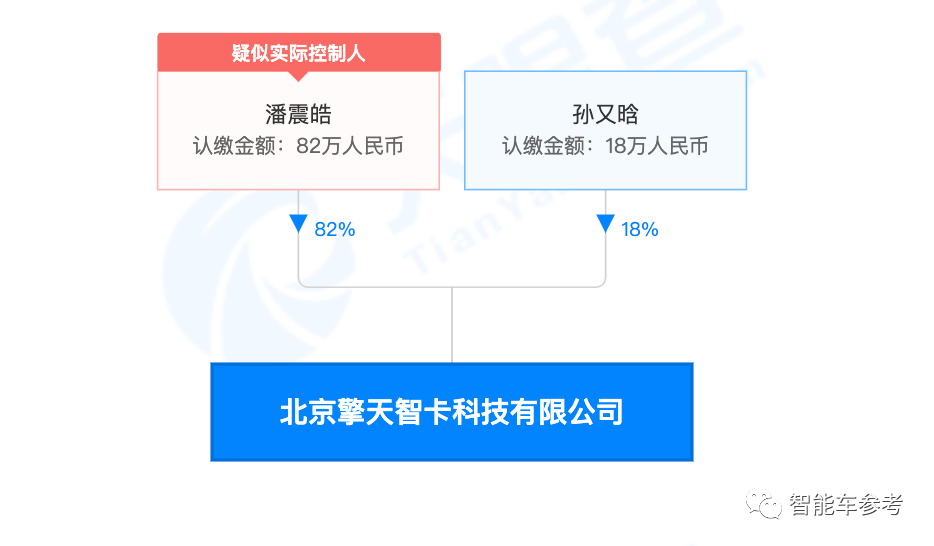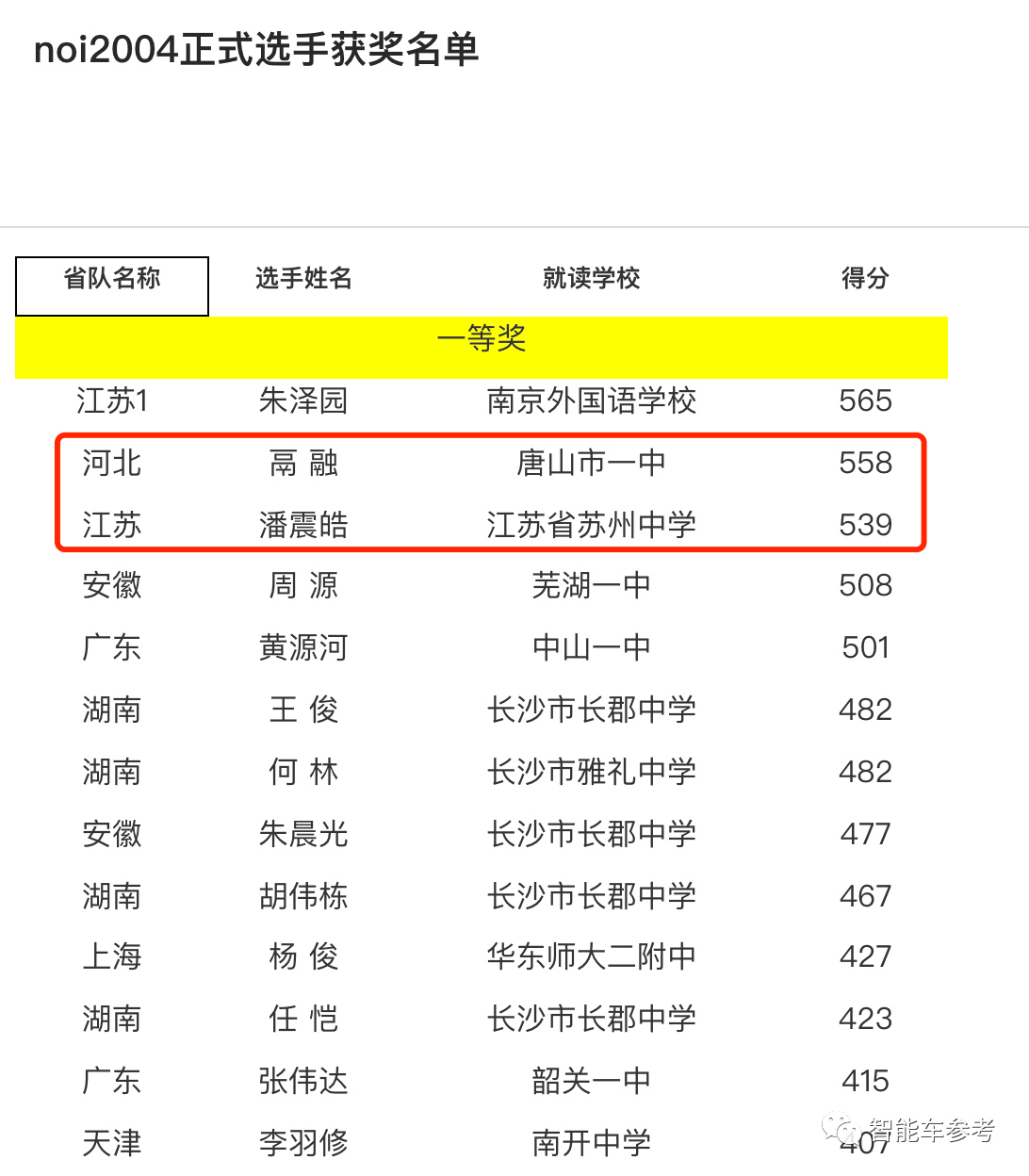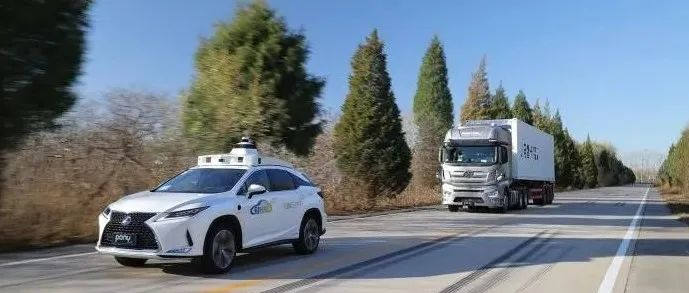LG sent from Fajiasi
Intelligent Car Reference | AI4Auto WeChat Official Account
Such confidence, such grandeur.
We are talking about Xiaoma Zhixing, and we are talking about Peng Jun and Lou Jiaozhu.
Now, a newly established automatic driving truck company has received nearly tens of millions of dollars in angel investment from Wuyuan Capital.
What does this have to do with Xiaoma Zhixing?
Wuyuan Capital is Xiaoma Zhixing’s A-round leading investor, and an important early shareholder after Sequoia and IDG.
The newly invested autonomous driving company, Qingtian Zhika, comes from Xiaoma Zhixing, and its founding team consists of core technology personnel who participated in Xiaoma Zhixing/ Zhika’s entrepreneurship.
One named Pan Zhenhao, the other named Sun Youhan.
Both are old friends of Lou Jiaozhu in the programming competition circle, and are also gold medalists from Jiangsu in the National Olympiad in Informatics (NOI).
It is not surprising that technical talents leave to start their own businesses. However, there are always human feelings in the martial arts.
To be honest, Wuyuan’s investment in Qingtian cannot be done without Xiaoma’s knowledge. After all, once such examples are set, competing in the same track is easy, but military morale is important.
Earlier, most of the giants or unicorn companies had torn faces, exerted pressure, and announced the chase in the martial arts…
So this financing progress is really not simple.

New Player in Autonomous Driving: Qingtian Zhika
Qingtian Zhika, founded in November 2021, is a company that focuses on the R&D of autonomous driving truck technology and targets the trunk logistics market. The current team size is nearly 20 people.
According to Wuyuan’s official announcement, all members of the startup team have senior autonomous driving experience.
But the focus is still on the two founders.
Pan Zhenhao (Frank Pan), the 12th employee of Xiaoma Zhixing, was the CTO of Xiaoma Zhika’s truck business before he resigned.
Sun Youhan was previously the planning and control manager of Xiaoma’s US team.
Pan and Sun are also old friends in the OI competition circle, and are both from Jiangsu in the same year.
Pan Zhenhao graduated from Suzhou High School and won first prize in the National Informatics Olympiad in 2004, with Yaoban Diyi Gangrong on the same list. Pan Zhenhao was admitted to the Department of Computer Science at Tsinghua University with an NOI gold medal and obtained a master’s degree from Tsinghua University.

In 2012, he joined Google and later answered the call of Peng Jun and Lou Jiaozhu to join Xiaoma Zhixing in 2017 from Google.
Pan Zhenhao was responsible for a period of road testing projects in the Bay Area within Xiaoma, and later became CTO after Zhika’s business was independent.According to the internal discussion, Frank has been widely recognized for his technical abilities, but his personality is also distinctive.
On the other hand, Sun Youhan used to be relatively low-key. He graduated from Changzhou High School and was admitted to Tsinghua University with Pan Zhenhao in the same year. Later, he studied abroad at Columbia University and worked at Microsoft and Facebook for a period of time. In 2019, he joined Pony.ai and is responsible for the planning and control of the company’s autonomous truck business in the United States.
In the external introduction, Pan Zhenhao stated that the autonomous truck industry is still in its early stages of development, and the industry structure and business model have not yet formed a fixed pattern. This is also the opportunity for startups like Qinteq and Qiner.
Pan also believes that in the current logistics industry, long-haul transportation is often equipped with 2-3 drivers. With the help of autonomous driving systems, even if one driver is retained, the business model of autonomous trucks can still be established, greatly alleviating the pain points of industry fatigue driving and high labor costs.
This cognition and direction are also the consensus reached by Pony.ai.
Of course, the well-established Waymo, the world’s first autonomous driving leader, has already proven this path.
However, why did Pan and Sun, as well as the emerging Qinteq, split from Pony.ai to start their own businesses?
The reasons are complex but can be summed up in two aspects.
One aspect is external. The core issue is the challenges Pony.ai faced in 2021. The original plan for an IPO in the US was adjusted, and targeted resource adjustments were needed to respond to the changes.
Specifically, independent development of the truck business and the establishment of independent R&D may have had long-term separation plans, but at that time, resource reconstruction and concentration were needed.
However, external influences can bring new challenges to internal restructuring.
For instance, where should the CTO and head of the Smart Card BU be placed in the central R&D architecture?
Therefore, the more important factor is the internal aspect.
As we all know, Pony.ai may have had the highest concentration of technical geniuses, and under these circumstances, coupled with the impact of Waymo’s successful listing, can they not be ambitious?
And perhaps all these people have never lacked the temptation of offers and external VCs.
A company worth 100 billion US dollars is difficult, and a valuation of 10 billion US dollars also poses a big challenge, but while the technical threshold still exists, creating an independent 1 billion US dollar company could provide higher personal returns.
It’s a basic math problem and it’s easy to calculate.## On Pony.ai: Great winds reveal strong grass
What’s hard to calculate?
Personal emotions.
Autonomous driving is not a mature industry yet, and stories of love and hate abound. There are not many moments of giving up.
Pony.ai is a rare player that can accept key shareholders investing in departing employees’ start-ups.
Is it possible that Pony.ai had no choice when it came to “capital”?
It’s possible, but when it comes to knowledge of the intelligent vehicle industry, founder Peng Jun and Chief Scientist Lou Tiancheng are the main contributors, and they have a broad outlook on things.
On one hand, in the five years since its founding, Pony.ai has gathered a group of talented technologists who have changed jobs and left, but their departures were not acrimonious and there was even continued business contact.
On the other hand, Pony.ai also has its own “unconventional” hiring “rules,” few offers in hand, and talented people not necessarily snatched up by the industry.
Peng Jun and Lou Tiancheng have shown uncommon breadth of vision and mindset since the company’s founding.
When questioned early on about “industry competition,” the discussion was mostly about the time when the industry wasn’t yet in a state of hyper-competition, and focused on the ability to push technology faster and be more efficient in product implementation.
This type of thinking also applies to personnel and employee issues.
If one just looks at Pony.ai’s work environment and compensation, sometimes it seems more generous than a fledgling start-up. Many former Google employees don’t even feel like they’re working for a “start-up.”
Even after an employee leaves, belongings such as clothing and personal items still bear the pony.ai logo.
As one employee described it: “They gave out everything except shoes…even pony.ai socks were given out.”
However, this “generosity” doesn’t mean that Pony.ai is a “plush” company. In many ways, it’s the most frugal of self-driving unicorns with the highest valuations.
The core reason is that based on the fundamental acknowledgment that talent is the driving force behind any technology company’s competitive edge, and in the end, it all comes down to talent.
The only drawback of top talent is that they are expensive.
However, this attraction to top talent also naturally carries a corresponding counteracting force in the face of external changes and impacts in 2021.
From an external perspective, Pony.ai has been soaring since its founding in 2016, so much so that the just passed 2021 proved to be so challenging.
However, according to reports, the founders still maintain an optimistic outlook.
Their belief is that the greatest winds reveal the strongest grass, and if one doesn’t go through adversity, how can they test the talent flocking in during times of prosperity?
Well, they’re very confident, and their mindset is truly outstanding.“`html
“`
This article is a translation by ChatGPT of a Chinese report from 42HOW. If you have any questions about it, please email bd@42how.com.
